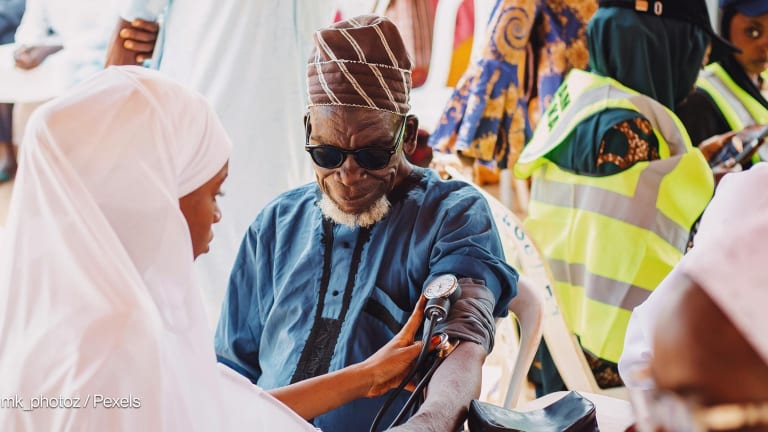Global effort needed to tackle the double burden of diabetes and TB

As one of the leading causes of morbidity and mortality globally, approximately 537 million adults are living with diabetes. Diabetes should, however, not limit quality of life, hence good glycemic control is important.
Undetected or uncontrolled, diabetes can lead to a number of complications, including micro- and macrovascular as well as kidney disease. What might be less known, is that when diabetes is prevalent, there is also an increased risk of tuberculosis, or TB. In advance of World Diabetes Day 2023, the World Health Organization highlighted the need for equitable access to essential care for people affected by diabetes and TB. Equitable access to care is also essential to ending TB, as was highlighted in WHO’s End TB Strategy and reinforced in the political declarations of the United Nations high-level meetings on the fight against TB in 2018 and 2023.
“People with diabetes have a two to three times higher risk of developing TB disease compared to people without diabetes,” explained Lena Wahlhed, director for alliance development at HemoCue. Diabetes weakens a person's immune system and increases the risk of getting active TB. Similarly, TB causes stress-induced hyperglycemia — a rise in blood sugar — which can make the management of diabetes more difficult, she explained. “This is concerning as poor glycemic control has been linked to poor outcomes in TB treatment — and diabetes-related complications.”
HemoCue and Cepheid, both companies within Danaher Corp, provide foundational essential diagnostic solutions that enable high-quality care across clinical settings and geographies.
Learn more about HemoCue here.
In 2019, the prevalence of diabetes in patients with TB was 15%, whereas in the general population, it was 9.3%.
“It's important not just to look at the big numbers and percentages, but consider that each one affected is a patient with friends or family,” said Wahlhed. “The double burden of TB and diabetes has a severe impact on that individual's life.” While preventable and treatable, TB can be spread through the air and is the second leading infectious killer globally after COVID-19.
Wahlhed spoke to Devex about the importance of screening and a holistic approach in tackling diabetes and TB, and why there needs to be a global effort to tackle the double burden of these diseases.
This conversation has been edited for length and clarity.
Why is it so critical that health systems and strategies address comorbidities and risk factors for TB?
Diabetes plays an important role in TB and vice versa, and in the outcome for these patients. Focusing on diabetes management in this patient group can therefore add tremendously to the patient’s life and society. Understanding the link between diabetes and TB calls for dual detection and action, especially in addressing the high incidence of undiagnosed diabetes in this population. There's a big difference and a larger prevalence of undiagnosed diabetes among patients with TB. We need to look at patients from a holistic view and consider what we know about this patient, or what other risks there could be for that individual. It’s a golden opportunity to advance care and address two difficult illnesses and improve patients’ lives.
There are programs implemented and funded by agencies, such as The Global Fund to Fight AIDS, Tuberculosis and Malaria, but there are fewer efforts aimed at addressing diabetes. While there is an increasing emphasis on domestic funding mobilization in addition to Global Fund and other global donors’ resources, domestic funding needs to support addressing TB and diabetes as a national priority for sustainable public health.
How could a greater focus on screening for diabetes, particularly in vulnerable groups, improve patient outcomes and reduce mortality rates of these two diseases?
Once diagnosed, diabetes can easily be monitored to ensure that the patient has good glycemic control, which can be done either through a hemoglobin A1c test, or, where this is not available, accurate point-of-care glucose methods.
However, diabetes, especially if undiagnosed or uncontrolled, can have severe effects. Patients with TB and coexistent diabetes have a higher risk of TB relapse after treatment and a two times higher risk of mortality during such treatment. This may be especially devastating among vulnerable groups, including those with HIV, in low- and middle-income countries like India, Pakistan, Bangladesh, Indonesia, and the Philippines. The problem — and the link — between diabetes and TB is also as evident in high-income countries like the U.S. and Japan. It is critical that we address the need and allow testing to be available for these groups. From a HemoCue and Cepheid point of view, we do our best to be available for these communities, raise awareness about diabetes and TB and who is being impacted by these diseases, as well as advocate for global funding where domestic funding is not available.
How can we ensure equitable access to screening tools across low- and middle-income contexts where TB prevalence is high?
WHO’s essential diagnostic list shares what tests should be available at the point of care, including where there are no laboratories. This list includes both TB tests and tests for glucose and HbA1c.
For HemoCue, the objective is not to create the need, but instead to meet it. WHO is raising awareness and ensuring policies and high-level dialogue. FIND addresses how we can ensure that point-of-care testing is available where it's needed, which is in support of WHO’s call for diagnostics not only to be available, but to be affordable and accessible. We encourage our local partners to be active in this field, and again, to meet the need and not create it.
Why is a collaborative approach critical to tackling diabetes and TB, and what different stakeholders and health programs need to be involved?
With limited funding, ministries of health and public health authorities need to make priorities and look at how they can help the most at the lowest cost with the biggest impact, but we mustn't forget the people who have more complex diseases. You might not be able to cure a patient with diabetes, but you can prevent complications that are far more expensive to treat down the line. So, what we do now will have an effect on the short term and the long term, both for the society and for the patient.
It’s important that we create awareness so that funding is increasing for these diseases in support of those affected, and I hope to see programs that address both diabetes in TB and TB in diabetes patients. What I would like to see is that we address public health and, in that dialogue, include these subjects. It’s important to address how to further establish sustainable practices close to the communities and ensure access to care with easy-to-use point-of-care diagnostics. Advancing care — improving life while leaving no one behind.
For more information about HemoCue, visit https://www.hemocue.com.
Search for articles
Most Read
- 1
- 2
- 3
- 4
- 5








